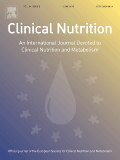
CLINICAL NUTRITION
Scope & Guideline
Elevating Patient Outcomes through Evidence-Based Nutrition
Introduction
Aims and Scopes
- Nutritional Epidemiology:
Researching the relationships between dietary patterns, nutritional intake, and health outcomes across various populations, often employing longitudinal and cohort study designs. - Clinical Trials and Interventions:
Conducting randomized controlled trials to evaluate the efficacy of dietary interventions, supplements, and nutritional therapies in clinical settings. - Public Health Nutrition:
Examining how nutrition impacts public health, including studies on food security, dietary guidelines, and policy implications for improving population health. - Nutritional Biochemistry and Metabolism:
Exploring the biochemical mechanisms through which nutrients affect metabolism, health, and disease, including studies on micronutrients, macronutrients, and metabolic pathways. - Maternal and Child Nutrition:
Focusing on the nutritional needs and interventions required during pregnancy and early childhood, addressing issues like breastfeeding, micronutrient supplementation, and growth outcomes. - Nutritional Genomics:
Investigating the interactions between genetics and nutrition, including how genetic predispositions influence dietary needs and health outcomes.
Trending and Emerging
- Plant-Based Diets:
There is a growing emphasis on the health benefits of plant-based diets, including their role in chronic disease prevention, sustainability, and nutritional adequacy. - Precision Nutrition:
Research into personalized nutrition approaches based on individual genetics, microbiomes, and metabolic responses is gaining traction, highlighting the need for tailored dietary recommendations. - Nutrition and Mental Health:
An increasing number of studies are exploring the relationship between diet and mental health, with a focus on how specific dietary patterns can influence mood, cognition, and mental well-being. - Sustainability and Nutrition:
Emerging research focuses on the environmental impact of dietary choices, promoting sustainable eating habits and assessing the nutritional quality of food systems. - Microbiome and Nutrition:
Investigations into the gut microbiome's role in nutrition and health are trending, particularly how dietary choices affect microbial diversity and its implications for overall health. - Nutritional Interventions in Chronic Disease Management:
There is a heightened interest in how nutrition can be effectively integrated into the management of chronic diseases such as diabetes, cardiovascular diseases, and obesity.
Declining or Waning
- Traditional Diets and Cultural Nutrition:
Research on traditional diets or cultural food practices has decreased, possibly overshadowed by the focus on modern dietary interventions and the impacts of processed foods. - Single Nutrient Studies:
Studies focusing solely on the effects of individual nutrients (e.g., isolated vitamins or minerals) are becoming less common, as there is a growing recognition of the importance of overall dietary patterns. - Animal-Based Diets and Meat Consumption:
There is a noticeable reduction in studies promoting animal-based diets, likely due to increasing interest in plant-based diets and their health benefits. - Food Processing and Nutritional Quality:
Research exploring the effects of food processing on nutrition has decreased, possibly as newer topics like ultraprocessed foods and their health implications take precedence.
Similar Journals
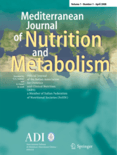
Mediterranean Journal of Nutrition and Metabolism
Connecting Nutrition, Metabolism, and Human HealthMediterranean Journal of Nutrition and Metabolism, published by IOS PRESS, is a leading platform dedicated to advancing the scientific discourse in the fields of nutrition and metabolism. Established in 2008, this journal addresses the increasing importance of dietary and metabolic research as it relates to human health. With an ISSN of 1973-798X and an E-ISSN of 1973-7998, it provides a vital resource for researchers and professionals aiming to explore the intricate relationships between nutrition, dietetics, and metabolic health. The journal is indexed in various categories, achieving notable rankings such as Q3 in Food Science and Nutrition and Dietetics, reflecting its commitment to rigorous scientific standards and impactful research. While the Mediterranean Journal of Nutrition and Metabolism currently does not operate under an Open Access model, it offers invaluable insights and findings that are essential for those dedicated to understanding and improving nutritional practices globally. By fostering collaboration and innovation, this journal serves as a cornerstone for scholars, supporting the dissemination of knowledge that enhances health outcomes across diverse populations.
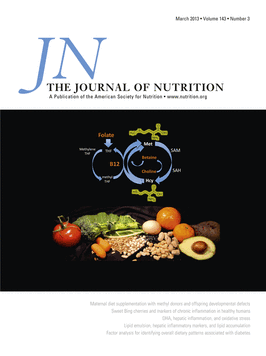
JOURNAL OF NUTRITION
Connecting researchers to the future of nutrition.JOURNAL OF NUTRITION is a premier academic journal published by Elsevier Science Inc, dedicated to advancing the understanding of nutritional science and its impact on health. With a long-standing tradition since its inception in 1945, the journal provides a vital platform for high-quality research, featuring articles that cover a wide range of topics within the fields of Medicine and Nutrition and Dietetics. Recognized for its significant contributions, the journal holds an impressive impact factor, with a Q1 rank in both Medicine (miscellaneous) and Nutrition and Dietetics as of 2023, positioning it among the top tier of scholarly publications in these disciplines. The Scopus Rankings further validate its status, boasting a rank of #57/398 in Medicine and #30/140 in Nutrition, indicating its influential presence in the research community. Although it operates under a traditional access model, the journal actively engages with a global audience of researchers, professionals, and students by disseminating cutting-edge insights designed to inform nutrition policy and practice. By focusing on current trends, innovative methodologies, and evidence-based nutrition strategies, the JOURNAL OF NUTRITION continues to be an essential resource for those committed to enhancing health through nutrition.

Nutrition Journal
Empowering Healthy Choices with Groundbreaking Research.Nutrition Journal is a prestigious open-access publication from BMC, dedicated to advancing the field of nutrition and dietetics since its inception in 2002. With an impressive impact factor and a notable Scopus ranking, it ranks in the top quartile (Q1) in both Medicine (miscellaneous) and Nutrition and Dietetics, highlighting its significant contribution to health sciences. Based in the United Kingdom, the journal covers a broad spectrum of topics, making it an essential resource for researchers, healthcare professionals, and students interested in nutrition's role in health and disease prevention. The journal not only facilitates the dissemination of groundbreaking research but also prioritizes accessibility, allowing global audiences to engage with vital findings that shape dietary practices and public health policies. With a commitment to interdisciplinary collaboration, Nutrition Journal fosters an environment where innovative ideas and evidence-based solutions can flourish, making it a cornerstone reference in the field.

NUTRITION RESEARCH
Leading the Charge in Nutritional Science and HealthNUTRITION RESEARCH, published by PERGAMON-ELSEVIER SCIENCE LTD, stands as a pivotal platform for the dissemination of groundbreaking research in the fields of nutrition, dietetics, and endocrinology. With an established track record since 1981, the journal has successfully converged its academic purview into 2024, providing a continuous source of high-impact studies that address critical issues in human health and nutrition. Recognized as a Q2 journal in multiple relevant categories, including Endocrinology and Nutrition, as well as boasting respectable Scopus rankings, it serves a diverse audience of researchers, professionals, and students eager to enhance their understanding of nutritional science. Although the journal does not operate on an open access model, its contributions are invaluable, fostering advancements and collaboration within the scientific community dedicated to improving dietary practices and outcomes. The current address of the journal is THE BOULEVARD, LANGFORD LANE, KIDLINGTON, OXFORD OX5 1GB, ENGLAND, positioning it at the heart of global research initiatives.

NUTRITION
Advancing dietary science for a healthier tomorrow.NUTRITION is a prestigious peer-reviewed journal published by Elsevier Science Inc, dedicated to advancing the field of dietary practices and metabolism. With an ISSN of 0899-9007 and an E-ISSN of 1873-1244, this journal has been serving the academic community since its inception in 1987, showcasing high-quality research and reviews through 2024. Recognized for its significant contributions to the fields of Endocrinology, Diabetes and Metabolism and Nutrition and Dietetics, NUTRITION holds a commendable Q2 category ranking in both areas, reflecting its impactful presence with a Scopus rank of #26 out of 140 and #51 out of 244 in its respective categories. The journal primarily aims to disseminate innovative research findings that illuminate the complex interplay between nutrition and health, fostering a deeper understanding among researchers, healthcare professionals, and students alike. By bridging scientific inquiry with practical application, NUTRITION plays a vital role in shaping public health policies and dietary recommendations worldwide.
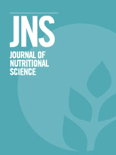
Journal of Nutritional Science
Connecting researchers to revolutionize nutritional science.The Journal of Nutritional Science, published by Cambridge University Press, is a leading open-access journal dedicated to the field of nutrition and dietary research. Established in 2012, this journal aims to disseminate high-quality research on nutrition, dietetics, and their implications for health and disease. With an impact factor reflective of its growing importance—holding Q2 and Q3 rankings in relevant categories such as Nutrition and Dietetics and Endocrinology—the journal serves as a vital platform for researchers, professionals, and students interested in evidence-based advancements within the nutritional sciences. The Journal of Nutritional Science is based in the United Kingdom and leverages a global network of experts to foster discussions that drive innovation in food science and health policies. By enabling open access to its content, it ensures that critical knowledge is readily available to the academic community and beyond, promoting a healthier, more informed society.

Nutrients
Exploring the vital links between nutrition and health.Nutrients is a premier, peer-reviewed open access journal published by MDPI, dedicated to advancing the field of nutrition and dietary research. Since its inception in 2009, this journal has consistently garnered acclaim, achieving a Q1 ranking in both Food Science and Nutrition and Dietetics, reflecting its significant impact in these vital areas of study. With a robust Scopus ranking of #40 out of 389 in Food Science and #18 out of 140 in Nutrition and Dietetics, Nutrients has established itself as a leading platform for researchers, practitioners, and students aiming to share and gain insights into nutritional epidemiology, dietary interventions, and policy implications. Hailing from Basel, Switzerland, the journal ensures broader accessibility through its open access model, inviting diverse contributions that enhance our understanding of nutrition in health and disease. By fostering collaboration across disciplines, Nutrients not only serves as a resource for high-quality research but also encourages innovation essential for tackling global nutritional challenges.

EUROPEAN JOURNAL OF NUTRITION
Driving Change in Dietetics and Health OutcomesEuropean Journal of Nutrition, published by Springer Heidelberg, is a premier outlet for groundbreaking research in the field of nutrition and dietetics. Established in 1996 and set to continue its impactful legacy until at least 2024, this journal enjoys an impressive recognition, holding a Q1 category rank in both Medicine (miscellaneous) and Nutrition and Dietetics, with notable Scopus rankings that place it in the top 10% of its field. The journal facilitates open access options, enhancing the dissemination of knowledge across the globe. It serves as a vital platform for researchers, healthcare professionals, and students, promoting the exchange of innovative ideas and advancements in nutritional science that aim to improve health outcomes worldwide. With a commitment to quality and relevance, the European Journal of Nutrition continues to shape the future of nutrition research and practice.
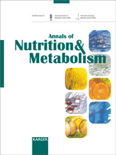
ANNALS OF NUTRITION AND METABOLISM
Connecting Research and Practice in NutritionANNALS OF NUTRITION AND METABOLISM is a prestigious academic journal dedicated to advancing the fields of nutrition and metabolism, published by KARGER, a renowned publisher known for its commitment to high-quality research dissemination. Founded in 1959, this journal has established itself as a crucial resource for researchers and practitioners alike, spanning an extensive range of topics that highlight the interplay between diet, health, and disease. Currently seated in Q2 categorically both in Medicine (Miscellaneous) and Nutrition and Dietetics, the journal ranks impressively within the Scopus metrics, showcasing its relevance and impact—positioned at the 80th percentile in Medicine and the 71st percentile in Nutrition. Though not open access, the journal ensures broad accessibility through various academic databases. By focusing on innovative research findings and clinical insights, the ANNALS OF NUTRITION AND METABOLISM aims to foster a deeper understanding of nutritional science, making it an indispensable platform for academics, healthcare professionals, and students alike to enhance their knowledge and contribute to ongoing discussions in this vital field.

Food & Nutrition Research
Advancing Nutrition Science for a Healthier TomorrowFood & Nutrition Research is a distinguished open-access journal published by the Swedish Nutrition Foundation, dedicated to advancing the field of food science and nutrition. With its ISSN 1654-6628 and E-ISSN 1654-661X, the journal has established itself as a leading platform for disseminating high-quality research since its transition to open access in 2008. Based in Lund, Sweden, this journal covers a broad spectrum of topics related to nutrition and dietetics, public health, and environmental health, achieving impressive rankings across several categories, including Q1 in Food Science and Q2 in Nutrition and Dietetics for 2023. Researchers and practitioners benefit from its accessibility and the opportunity to stay updated with significant developments in the field, given its notable Scopus rankings, which place it within the top percentiles of related disciplines. With converged years spanning from 2008 to 2024, Food & Nutrition Research serves as an essential resource for those committed to improving health outcomes through informed dietary practices.